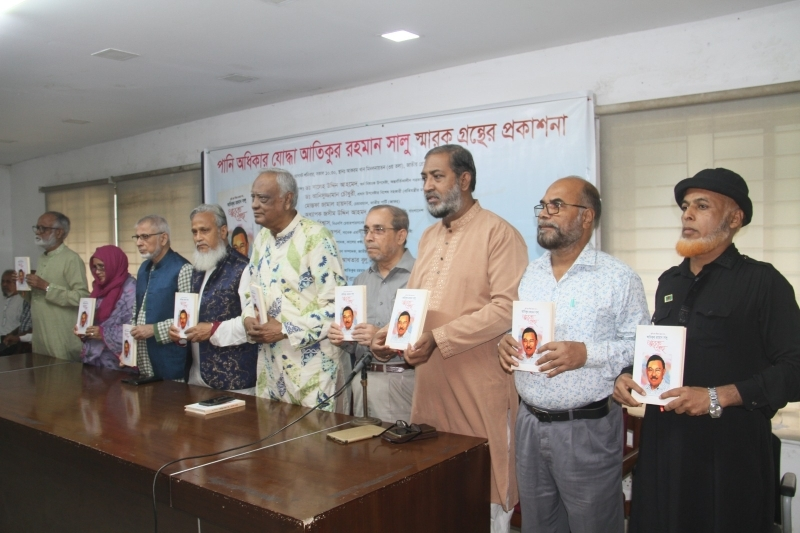- India Sees 9% Drop in Foreign Tourists as Bangladesh Visits Plunge |
- Dhaka Urges Restraint in Pakistan-Afghan War |
- Guterres Urges Action on Safe Migration Pact |
- OpenAI Raises $110B in Amazon-Led Funding |
- Puppet show enchants Children as Boi Mela comes alive on day 2 |
Experts Urge Stronger Fight for Bangladesh’s Water Rights

A pledge was expressed to accelerate the movement for the protection of river and water rights in Bangladesh on Saturday. Speakers said this at the publication of an Atiqur Rahman Salu memorial book at the Maulan Khan Hall of the National Press Club. Recalling the struggle of the water rights fighter, the speakers said that out of the 54 shared rivers with India, there is no water management agreement other than the Ganges. The Ganges Water Agreement again will expire in December next year (2026).
The Atiqur Rahman Salu memorial book, with a foreword written by Emeritus Professor Sirajul Islam Chowdhury of Dhaka University, sheds light on his life of struggle and work in a total of 30 articles. His uncompromising struggle in the river water rights movement of Bangladesh is mentioned as an unparalleled example that will inspire people for ages.
Speakers at the publication ceremony said that without any agreement or understanding, the upstream country India is creating a serious environmental disaster in Bangladesh by building dams on all the shared rivers and diverting the flow of water during the dry season. On the other hand, it is releasing flashy water without notice during the rainy season, creating catastrophic floods and river erosion. But in the present world, the solution to the shared river water problem lies in basin-based joint management so that all the upstream and downstream countries benefit from it. And at the same time, the rivers remain alive from their source in the Himalayas to the sea.
They said that Atiqur Rahman Salu's aim was to organise another big rally like the rally of one million people held in Chilmari on March 4, 2005, to present the demands of the people of Bangladesh for a fair share of river water to the world and to put pressure on India to solve this life-and-death problem. The signing of the landmark Ganga Water Treaty of 1977 was possible only after the historic Farakka Long March held on May 16, 1976 under the leadership of the oppressed people's leader Maulana Bhashani.
The event organized by the International Farakka Committee (IFC), Bangladesh was graced by the guests Dr. Anisuzzaman Chowdhury, Special Assistant to the Chief Advisor (with the rank of State Minister), Ministry of Finance; Mostafa Jamal Haider, Chairman, Jatiya Party (Zafar); Professor Jasim Uddin Ahmad, Chief Advisor, IFC, Bangladesh; Professor Shahria Akhtar Bulu, former Member of Parliament; Farida Eusufzai, wife of Atiqur Rahman Salu and publisher of the memorial book; Mostafafizur Rahman Iran, Chairman, Bangladesh Labour Party and Kamrul Huda, editor of the memorial book. Syed Tipu Sultan, Chairman, IFC, New York presided over the function while Mostafa Kamal Majumder, President, IFC, Bangladesh, moderated it.
Among others, the function was also addressed by Gias Ahmed, Adviser of the Bhashani Foundation in New York; Principal Sheikh Firoz Ahmad; Professor Israrul Haque; Kamal Uddin Chowdhury; Principal Abdul Mannan Khan; Advocate Mujibur Rahman; Jamaluddin Jamal; Rafiqul Islam Azad; and Ataur Rahman Ata.

